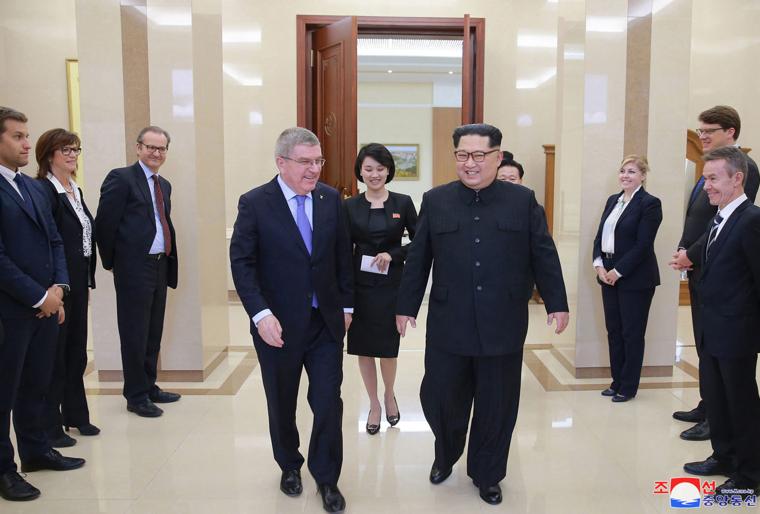
By Daniel Etchells |
The International Olympic Committee (IOC) will stay “politically neutral” about North Korea’s involvement at the 2020 Olympic Games in Tokyo, Coordination Commission chairperson John Coates said.
Last month, North Korean leader Kim Jong-un reportedly committed to his country participating at Tokyo 2020 and Beijing 2022 during a meeting with IOC President Thomas Bach in Pyongyang.
Bach undertook a three-day visit as he sought to capitalize in the cooling of regional tensions prompted in part by North Korea’s participation at February’s Winter Olympics in Pyeongchang.
North Korean citizens are currently banned from entering Japan.
Relations between the two countries are currently severely strained.
This is caused by North Korea’s nuclear program under Kim and also lingering tension over abductions of Japanese citizens by agents of the North Korean Government which occurred during a period of six years from 1977 to 1983.
Speaking at a news conference in Tokyo to mark the end of a two-day visit to inspect preparations for the 2020 Olympics, Coates insisted the IOC will not try to force the Government to accept non-sporting visitors.
“We are keen to see sport be available to people in North Korea, to assist in the development of sport there, but in all of this the IOC’s position is one of political neutrality and will remain that,” he was reported as saying by The Japan Times.
“Under the Olympic Charter, there is an obligation on a host Government to allow free access to all delegations, athletes and their officials who are accredited for the Games.
“That’s not to say, though, that a host Government does not have control over who it wants to invite in terms of political leaders.”
Earlier this month, Japanese Prime Minister Shinzō Abe delivered cautious support for North Korea’s participation at Tokyo 2020 following a phone conversation with Bach.
Abe reiterated his commitment to work closely alongside the IOC, a statement on the Japanese Ministry of Foreign Affairs website said, to ensure the success of Tokyo 2020.
According to Japanese reports, however, Abe also said that they must pay attention to the feelings of citizens over North Korea because of the “abduction issue.”
A total of 17 Japanese citizens are officially recognized by the country’s Government as having been abducted by agents of the North Korean Government.
It is suspected that the actual number of victims is far higher, possibly numbering in the hundreds.
Tokyo 2020 President Yoshirō Mori has also suggested a cautious approach.
“I obviously read about particular issues for Japanese of North Koreans participating here,” Coates added.
“I personally understand the terrible pain…those who were taken away and the families who were left behind experienced.
“I also am trying to understand the burden that your Prime Minister so obviously feels about this.
“But they’re all matters that he’s doing on a political level and not something that the IOC will or should become involved in.”
A total of 22 athletes from North Korea competed at Pyeongchang 2018 after an IOC-led four party meeting in Lausanne on January 20, which also involved South Korea and Games organizers.
This included a single women’s ice hockey team as well as a joint Korean march under the unified flag at the Opening Ceremony.
Bach insisted that political neutrality was the secret of the IOC’s success in encouraging North Korean participation at Pyeongchang 2018.
He added that it is “naïve” and “unrealistic” to believe the Olympic Games can ignore wider political developments but claimed this could be done while remaining strictly neutral.
A North Korean team has participated at every addition of the Summer Olympics since they boycotted Seoul 1988.
They missed the Lillehammer 1994, Salt Lake City 2002 and Sochi 2014 Winter editions, however, due to not qualifying any athletes.
Coates today described Tokyo 2020’s preparations as “very good”, despite warning yesterday the Organizing Committee risks losing the confidence of key stakeholders in its ability to host the Games if questions raised are not answered.
The Australian told organizers to expect more questions from International Federations (IFs) and National Olympic Committees in the build-up to the Games in two years’ time after World Sailing led criticism of preparations for Tokyo 2020 at last week’s SportAccord Summit in Bangkok.
World Sailing claimed Japanese organizers were one year behind schedule during the Association of Summer Olympic International Federations General Assembly in the Thai capital.
Around 10 world governing body representatives raised concerns with different aspects of progress during the meeting.
Christophe Dubi, the IOC’s Olympic Games executive director, claimed International Federations “would very much like to contribute to resolving issues.”
“They feel they can really bring something.” he was reported as saying at today’s news conference by The Japan Times.
“So the relationship with the sport managers is incredibly important to efficiently resolve problems when they surface.
“They want to contribute and they want fast resolution of issues.
“This is definitely something that Tokyo 2020 embraced.
“So we are going in the right direction.”
Republished with permission from insidethegames.biz.